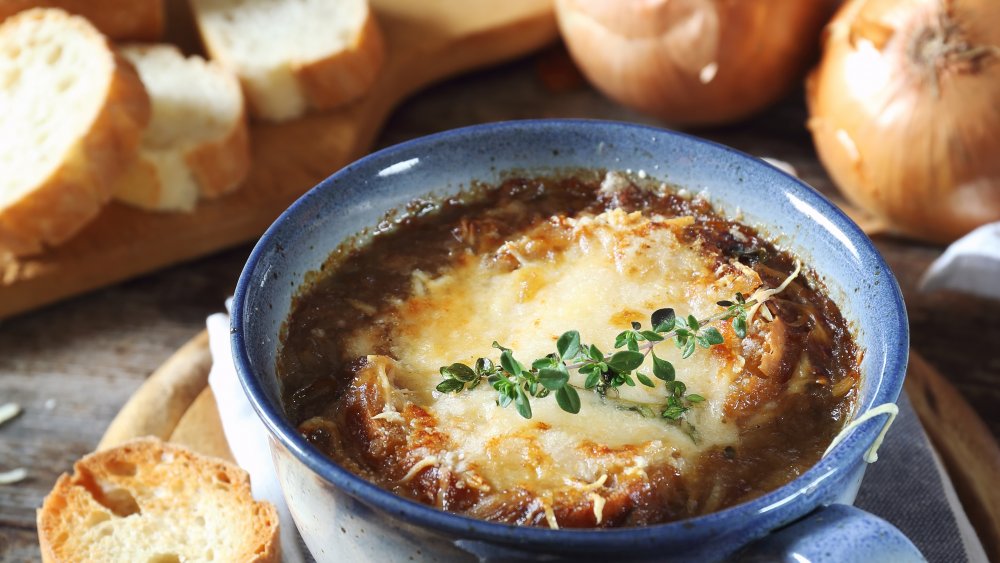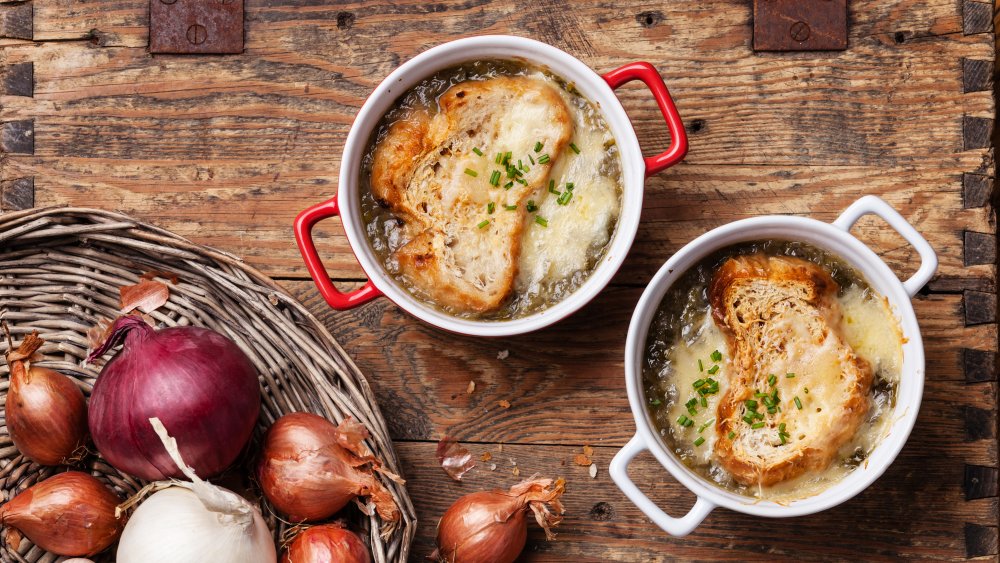The Real Difference Between French Onion Soup And English Onion Soup
Most people are acquainted with onion soup in one form or another. It's the thing that makes the house smell like buttery, oniony heaven for about an hour while you make it, and the thing that makes you feel like all is right with the world when you eat it. A warm bowl of hearty soup after a long day is tough to beat, plus, it's so economical. ifood.TV says that the ease and low cost of growing onions made onion soups popular back in Roman times. The wide availability of onions made onion soup an accessible meal, even for people without much money.
There are two directions your onion soup can take – either French or English – and the ingredients make all the difference. Both French onion soup and English onion soup start with onions and a brothy base, and both have bread and cheese (via Erin Nudi). But, that's where the similarities end. If you've only had one of these varieties, you may be tempted to switch things up and give a new version a try. A few onion-induced tears are well worth the tasty result either of these soups will provide.
French onion soup and English onion soup look similar but are very different
Both types of onion soup begin, of course, with onions. According to writer and blogger Erin Nudi, French onion soup will usually contain red and/or yellow onions, or the recipe won't specify. English onion soup will ask for a combination of white onions, red onions, shallots, and leeks. Jamie Oliver's recipe for English Onion Soup on Food Network encourages you to "get a hold of as many different types of onions for this soup as you can." The onions in Oliver's English onion soup and Julia Child's French Onion Soup on Food Network are both slow-cooked and caramelized. We could stop there because caramelized onions are pretty amazing on their own. But we're talking soup and that means broth or stock.
French onion soup almost always calls for beef stock or broth while English onion soup can be made with either beef, chicken, or vegetable stock or broth. Most French onion soups will also employ sherry, red wine, or (in Julia Child's case) cognac for flavor. Sometimes, English onion soup recipes will include Worcestershire sauce. Both versions usually incorporate woodsy herbs; thyme is common for French onion soup with sage being the choice for English. Next, we can get to the reason we're all really here: the bread and cheese.
The bread and cheese in your onion soup makes all the difference
Let's be real. Sometimes, onion soup is just a vehicle for toasted bread and melty cheese. Luckily, both the French and English versions come with a hearty slice of crusty bread and lots of oozy, melted cheese. If one didn't, it would clearly be fighting a losing battle in the world of soup. French onion soup, naturally, calls for French bread or a baguette while English onion soup is happy with any type of stale bread. If you're an onion soup novice, the bread gets toasted and set on top of the soup, where it's subsequently showered with lots of cheese.
When it comes to that cheese, the French prefer Gruyere, Emmental, and/or Swiss cheese. According to Real Swiss Cheese, these are nutty-tasting cheeses and they tend to melt well. English onion soup generally calls for cheddar cheese which, according to Cheese.com, originated in England, although it's manufactured all over the world today. In either case, the cheese belongs on top of the bread, on top of your soup. The last thing to do is transfer your assembled bowls of onion soup to the oven for a quick blast under the broiler until the cheese melts and becomes bubbly. Although French onion soup and English onion soup have differences, there's no contest here. Both are welcome on our table anytime.


